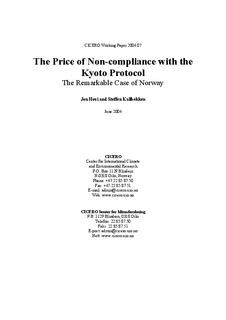| dc.contributor.author | Hovi, Jon | nb_NO |
| dc.contributor.author | Kallbekken, Steffen | nb_NO |
| dc.date.accessioned | 2014-03-17T14:31:22Z | |
| dc.date.available | 2014-03-17T14:31:22Z | |
| dc.date.issued | 2004 | nb_NO |
| dc.identifier.issn | 0504-452X | nb_NO |
| dc.identifier.uri | http://hdl.handle.net/11250/192316 | |
| dc.description.abstract | To induce compliance, an international enforcement mechanism needs to authorize the use of punitive consequences against a non-compliant country. However, it is reasonable to require that such consequences do not cause considerable damage to other countries as well. The compliance mechanism of the Kyoto Protocol does not meet this requirement. The Marrakesh Accords instruct the Enforcement Branch of the Compliance Committee to impose punitive consequences on a country that fails to fulfill its commitments. These consequences will not only be costly to the non-compliant country. They will have considerable adverse welfare effects for compliant countries too. Using a numerical model, we show that in the case of Norway, the welfare effects can actually be worse if another country (such as Canada, Japan or Russia) is punished than if Norway itself is punished. Similar effects will also be experienced by other buyers of emission permits. But Norway suffers more than other buyers because it is also a major exporter of fossil fuels. | nb_NO |
| dc.language.iso | eng | nb_NO |
| dc.publisher | CICERO Center for International Climate and Environmental Research - Oslo | nb_NO |
| dc.relation.ispartof | CICERO Working Paper | nb_NO |
| dc.relation.ispartofseries | CICERO Working Paper;2004:07 | nb_NO |
| dc.title | The Price of Non-compliance with the Kyoto Protocol: The Remarkable Case of Norway | nb_NO |
| dc.type | Working paper | nb_NO |
| dc.source.pagenumber | 13 | nb_NO |
| dc.identifier.cristin | 374138 | |
